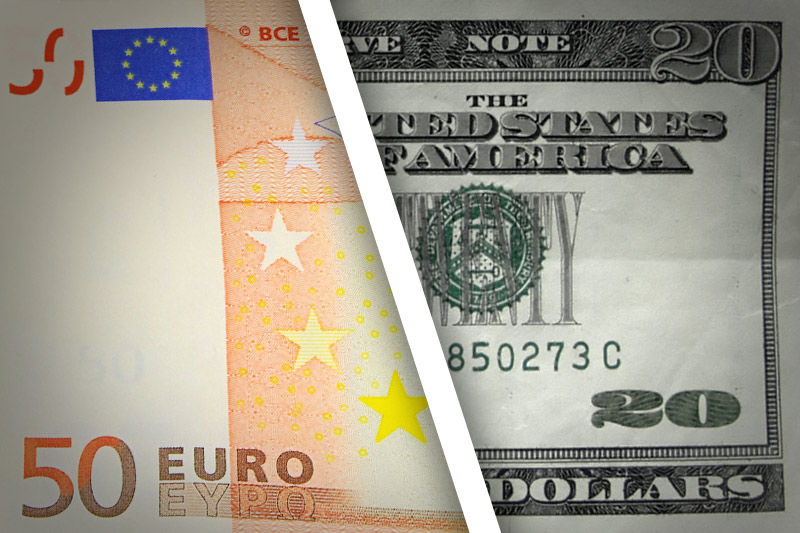Investing.com - The euro held on to losses against the U.S. dollar on Thursday, trading near a one-week low following the release of conflicting purchasing managers' surveys from Germany and France.
EUR/USD hit 1.2941 during European morning trade, the pair's lowest since September 13; the pair subsequently consolidated at 1.2971, dropping 0.59%.
The pair was likely to find support at 1.2861, the low of September 13 and resistance at 1.3085, Wednesday's high.
Euro zone manufacturing activity improved modestly in September, but remained in contraction territory for the 13th consecutive month, while service sector activity slumped to the lowest level since July 2009.
The euro zone’s manufacturing purchasing managers’ index rose to a seasonally adjusted 46.0 in September from a final reading of 45.1 in August, compared to expectations for a reading of 44.5.
The services PMI fell to 46.0 from 47.2 in August. Analysts had expected the index to tick up to 47.4 in September.
Manufacturing activity in France tumbled unexpectedly in September, dropping to a three-and-a-half year low.
France’s manufacturing PMI fell to 42.6 in September from a final reading of 46.0 in September. Analysts had expected the index to come in at 46.4.
Service sector activity in France declined to a four-month low of 46.1 in September from a final reading of 49.2 in August.
The single currency managed to come off the lowest levels of the session after data showed manufacturing activity in Germany in September contracted at the slowest rate in six months, while service sector activity grew modestly.
Germany’s manufacturing PMI rose to 47.3 in September from a final reading of 44.7 in September. Analysts had expected the index to come in at 45.3.
Service sector activity in Germany increased to a four-month high of 50.6 in September from a final reading of 48.3 in August.
The data came after a report showed China’s HSBC flash purchasing managers' index ticked up to 47.8 in September from a nine-month low in August of 47.6, but remained below 50 for an 11th consecutive month in a row, showing the sector was still contracting.
Meanwhile, uncertainty over whether Spain is about to ask for more financial aid continued to weigh on sentiment.
Markets were eyeing an auction of 10-year Spanish government bonds later in the day, as it was expected to be an important test of investor appetite for the country’s debt.
The euro was also lower against the pound with EUR/GBP shedding 0.34%, to hit 0.8017.
Later in the day, European Central Bank President Mario Draghi was to speak at a conference in Frankfurt, while the U.S. was to release its weekly government report on initial jobless claims, as well as an index of manufacturing activity in Philadelphia.
EUR/USD hit 1.2941 during European morning trade, the pair's lowest since September 13; the pair subsequently consolidated at 1.2971, dropping 0.59%.
The pair was likely to find support at 1.2861, the low of September 13 and resistance at 1.3085, Wednesday's high.
Euro zone manufacturing activity improved modestly in September, but remained in contraction territory for the 13th consecutive month, while service sector activity slumped to the lowest level since July 2009.
The euro zone’s manufacturing purchasing managers’ index rose to a seasonally adjusted 46.0 in September from a final reading of 45.1 in August, compared to expectations for a reading of 44.5.
The services PMI fell to 46.0 from 47.2 in August. Analysts had expected the index to tick up to 47.4 in September.
Manufacturing activity in France tumbled unexpectedly in September, dropping to a three-and-a-half year low.
France’s manufacturing PMI fell to 42.6 in September from a final reading of 46.0 in September. Analysts had expected the index to come in at 46.4.
Service sector activity in France declined to a four-month low of 46.1 in September from a final reading of 49.2 in August.
The single currency managed to come off the lowest levels of the session after data showed manufacturing activity in Germany in September contracted at the slowest rate in six months, while service sector activity grew modestly.
Germany’s manufacturing PMI rose to 47.3 in September from a final reading of 44.7 in September. Analysts had expected the index to come in at 45.3.
Service sector activity in Germany increased to a four-month high of 50.6 in September from a final reading of 48.3 in August.
The data came after a report showed China’s HSBC flash purchasing managers' index ticked up to 47.8 in September from a nine-month low in August of 47.6, but remained below 50 for an 11th consecutive month in a row, showing the sector was still contracting.
Meanwhile, uncertainty over whether Spain is about to ask for more financial aid continued to weigh on sentiment.
Markets were eyeing an auction of 10-year Spanish government bonds later in the day, as it was expected to be an important test of investor appetite for the country’s debt.
The euro was also lower against the pound with EUR/GBP shedding 0.34%, to hit 0.8017.
Later in the day, European Central Bank President Mario Draghi was to speak at a conference in Frankfurt, while the U.S. was to release its weekly government report on initial jobless claims, as well as an index of manufacturing activity in Philadelphia.
